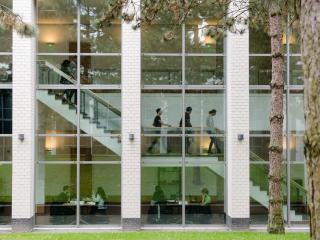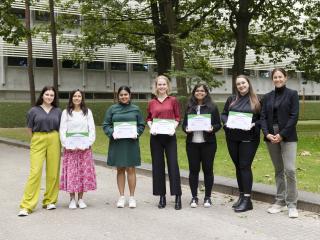The CentER Revolution: How Tilburg Rose from its Ashes
It’s the year 1988. The Center for Economic Research (CentER) in Tilburg saw the light of day. A light that was expected to eventually shine across the entire Tilburg School of Economics and Management (formerly FEW, now TiSEM). The spotlight has done its job. The School evolved into a bright lighthouse, even shining far beyond the borders in what was then an internationally gloomy Dutch economic landscape. This is the story of the CentER revolution and its driving force and unparalleled game-changer, Professor Arie Kapteyn, who had joined the Tilburg ranks in 1982.
CentER gave a tremendous boost to the School of Economics, even becoming the lifesaver for the declining School. Moreover, the institute set other Schools on a more viable course and, even more impressively, CentER pulled competing Schools along in the march of progress, according to insiders such as Marcel Das, Eric van Damme, Lans Bovenberg and Jan Boelhouwer. Aart de Zeeuw, former dean and former director of CentER, remarked: “Not only did Tilburg improve, but other Dutch economic Schools responded to the challenge, and research improved across the Netherlands as a whole.”
Alarm bells
In 1986, the Investigative Commission for Economics (Verkenningscommissie Economische Wetenschappen) published a report on the state of affairs in the land of economists. Its conclusion: the situation was dire, with occasional glimmers of hope. Tilburg found itself at the bottom and was at risk of closure should there be unexpected budget cuts.
An exit was certainly not inconceivable at that time. The then Minister of Education, Wim Deetman, aimed to trim down Tilburg University in 1986 by closing the Schools of Arts and Psychology. Two thousand protesting staff members marched to The Hague, led by the then crusading Rector Ruud de Moor (reluctantly in an academic gown) and the legendary press officer Maurice Ackermans, under the motto of ‘Brabant fights for its university.’ Successfully so. Arie Kapteyn was also part of the movement at that time, since “you shouldn’t only fight for your own partial interests (CentER, the School of Economics as a whole) but also for the collective interest (university).” In that year, the Investigative Commission also sounded the alarm for the entire School of Economics.
CentER’s mission was to address the shortcomings in Tilburg
What was wrong?
Tilburg economists barely played a role in the international economic arena: they had missed the boat and fell behind the mainstream, few publications were impactful, there was hardly any exchange, and there was no buzz. People did not publish and teach in the lingua franca of economics, English, except for a few econometricians such as Weddepohl, Ruys, and Kleijnen and macroeconomist Van de Klundert. In short, there was work to be done.
Top 40
Even in a first economists’ ranking, which had already published in 1980 under pseudonym by somebody called A.D.S. de Schuite, things looked grim for Tilburg. Behind the nom de plume – an anagram for Dutch Disease – were, as it later turned out, none other than Professors Arie Kapteyn and Tom Wansbeek. And ‘Arie ‘Baba’ and the Forty Thieves’ were to shake things up quite a bit. In the years that followed, there was considerable bickering over the controversial rankings. What counts and what doesn’t? Should we count at all? But, according to Kapteyn, there is no knowledge without measurement. You have to find a method to identify quality somehow. While such a ranking is not the be-all and end-all, you certainly have to do something. And he was quite open to adjustments of the lists, which did happen. Prof. Henri Theil ranked first in the inaugural Top 40 Chart. Anton Barten (CORE, Louvain), who was to become the first director of CentER, was second.
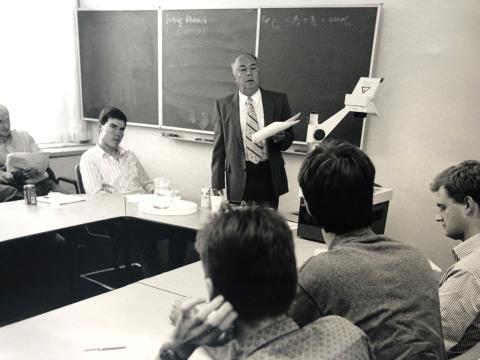
Prof. Henri Theil pictured during a CentER seminar (University of Florida)
Mission
CentER’s mission was to address the shortcomings in Tilburg. In addition to increasing visibility through quality research and publications, it was crucial to build international networks and create a reverse brain drain whereby successful and talented economists who had sought refuge abroad were brought back to establish a center similar to the CORE Institute in Leuven.
Startup subsidy
Arie Kapteyn, who obtained his PhD in 1972 under Bernard van Praag in Leiden, had become friends with Roel in ’t Veld, who later served as Director-General (DG) at the Ministry of Education & Sciences from 1982-88. With the support of Rector De Moor, a plan was presented to the DG by the Dean of the School of Economics, Piet Verheyen, and NAKE Professor of Quantitative Economics, Aart de Zeeuw. In ’t Veld liked the plan and rewarded the initiative with a startup subsidy of 4 million Dutch guilders. This helped Captain Arie to dock his still small vessel against the Tilburg mother ship. The vessel steadily developed into a veritable flagship, with an increasing number of young talents and external stars on board (such as Anton Barten from Leuven, Rick van der Ploeg from Oxford, game theorist Eric van Damme from Bonn, and John Driffill from Southampton). Later, Jan Magnus (London School of Economics) and Lans Bovenberg (IMF/EUR) also leapt into the deep end at CentER. School professors were appointed members of its Advisory Board (Ruys, Van de Klundert, and Sijben).
These recruits had to meet certain criteria, especially publishing in the then leading journals. It was a “publish or perish” scenario. The best School researchers gradually crossed over to CentER. The two graduate schools that emerged after 1992, those of Economics and of Management, also played their part. Both graduate schools quickly gained accreditation from the Royal Netherlands Academy of Arts and Sciences (KNAW). PhD candidates were strongly encouraged to complete their PhD studies at these graduate schools, and this ‘campaign’ became a major success. Many young PhD candidates, both internal and external, found their way to Tilburg. By 2017, over 350 PhD theses had been defended at CentER.
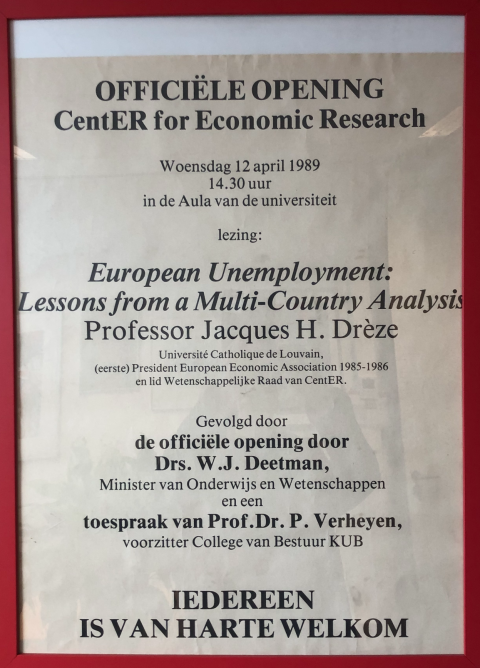
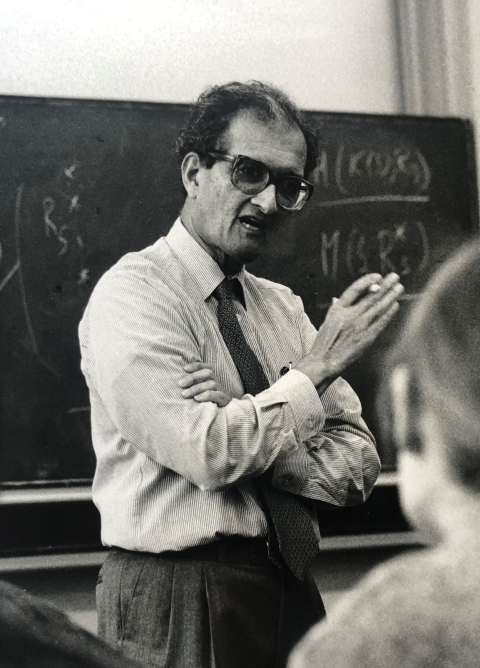
Centers of Excellence
The CentER model clearly had an impact on the rest of the university. Starting in 2011, the Executive Board encouraged and funded multidisciplinary research institutes. Established in 2005 with the funds acquired by Lans Bovenberg through his Spinoza Prize, Netspar was the first institute to be recognized as a Center of Excellence in 2011. Subsequently, the International Victimology Institute Tilburg (INTERVICT, 2011), the Tilburg Law and Economics Center (TiLEC, 2012), the Center for Research on Psychology in Somatic Diseases (CoRPS, 2014), and the Tilburg Center for Cognitive and Communication (TICC, 2015) followed suit.
Americanization
CentER’s success was not celebrated by everyone. Professor Ad Kolnaar, had observed the ‘revolution’ with dismay: “The university has hopelessly Americanized. This Americanization has yielded nothing, only alienation and disintegration. Consideration and deliberation have been sacrificed to a senseless publication frenzy, ridiculous rankings, and the stupid pursuit of higher and higher still. (...) Nowadays, everyone has their own specialized toy that requires their own institute. CentER, Netspar, Tilec, Tiber. I am not a supporter of so-called top-notch institutes. Specialization is wrong. You should integrate and generalize instead.”
Colleague Frans Boekema was not amused either: “The Top 40 Chart is not a good reflection of our field. It pushes non-mathematicians aside simply because they do not publish in the journals selected by Kapteyn. The horizon is wider than just mathematical and econometric achievements. With his selection, many excellent institutional and general economists, policy-oriented researchers, regional economists, political economists, and development economists are being overlooked.” The dissenting voices initially had little effect, although over time several adjustments were made to the ranking methodology.
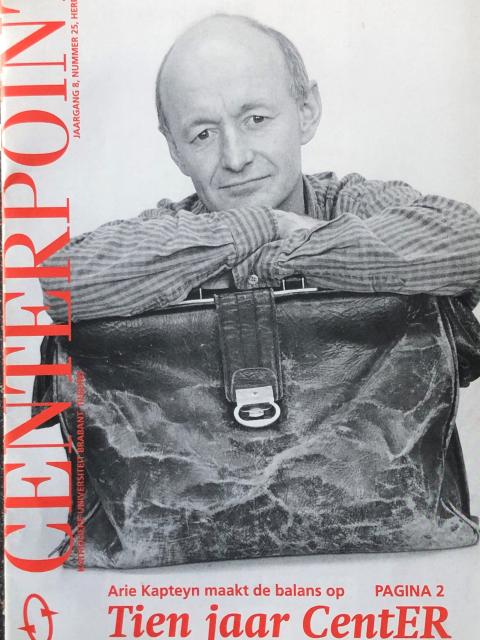
We could now serve diverse markets: the market of international research courses, fundamental research, and applied research for government and business
Arie Kapteyn
Trinity
Meanwhile, CentER grew in breadth and depth. The research fields encompassed all disciplines of the School of Economics and Management. The two graduate schools flourished and a trinity was formed with the accompanying flagships of CentERdata and CentER Applied Research (CAR). According to Kapteyn, this “created an optimal spectrum of expertise for both applied and fundamental research. We could now serve diverse markets: the market of international research courses, fundamental research, and applied research for government and business.”
Centerdata
Having lost the uppercase “ER” in the name by now, Centerdata emerged in 1996 through the acquisition of the nearly bankrupt Telepanel. This market research bureau of the University of Amsterdam (UvA) had a computer connection with about 2,000 households and later a panel of an additional 700 households from the higher-income bracket. The latter group was established by CentER at Telepanel as part of the VSB Bank savings project, for which several million guilders had been raised from the bank. Due to ongoing issues at Telepanel, the unique savings project was at risk of failure. This prompted Kapteyn to take over the operation and make it into a separate foundation. In his view, data was the new oil in the scientific engine, and Centerdata provided a new environment and impetus for science innovation.
Big Grant
Marcel Das, a CentER PhD (1998, see photo with the first set of computers for survey research) and director of Centerdata since 2000, praises Kapteyn for his decisiveness and perseverance in this regard: “Arie is my hero.” The data ship sailed smoothly under Das’ leadership, and in 2009 he was rewarded with an appointment as Professor of Econometrics and Data Collection. In 2005, the group received a tremendous boost with the allocation of a mega subsidy from NWO, the Dutch Research Council (Big Grant), amounting to a whopping € 14 million. With this funding, a state-of-the-art infrastructure could be established, the so-called Advanced Multidisciplinary Facility for Measurement and Experimentation in the Social Sciences. The SHARE (Survey of Health, Ageing and Retirement in Europe) project was also successful. Since 2002, Centerdata has been responsible for programming the questionnaires for all participating countries. In the LISS panel (2007), approximately 5,000 households are surveyed on various matters, including work, health, integration, savings, etc. CAR’s policy research was transferred to Centerdata in 2005.
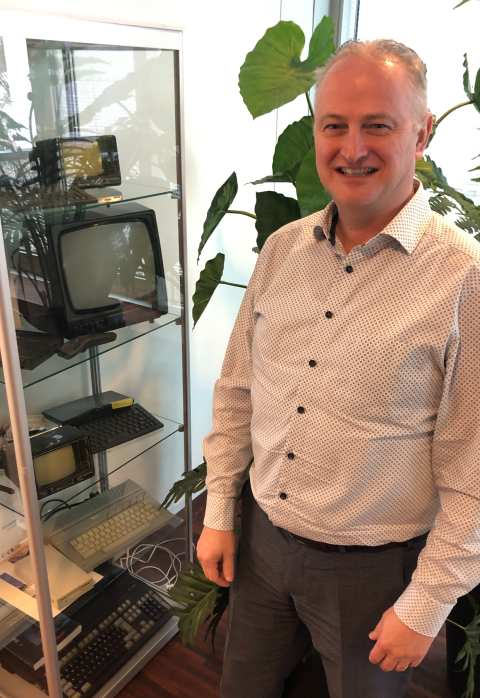
Conflict
In 2000, after his directorship, Kapteyn takes a sabbatical year. When he returns, conflict arises. The further ambitions that Arie wanted to realize with CentER did not align with those of the then President of the Executive Board, Yvonne van Rooy. She considered education a neglected aspect and was unwilling to further bolster the CentER fund. An interview with Univers on the occasion of her inauguration in 1997, already reflected the beginnings of the impending conflict: “Competition between universities is fine, but not in the American way, where some universities are only accessible to the elite.”
Farewell Kapteyn
Kapteyn stated at the time: “Apparently, when it comes to practice, the ambition level of Tilburg University is not very high, and I have drawn my own conclusions.” Disappointed, he throws in the towel and sets sail towards the States. In hindsight, Kapteyn acknowledges that he may have withdrawn too quickly. There were undoubtedly still opportunities to implement his ideas. There is one thing that he wants to get off his chest, though: universities should not be governed by politicians but rather by first-class scientists who understand the core business of conducting scientific research.
Anyway, that’s all water under the bridge. Still working in the US, he has remained closely involved with his other two ‘babies,’ Centerdata and CAR, to this day. His career in California is also quite impressive, where he pulled off a similar and unique data survey feat, first as the director of the Labor & Population division with the RAND Corporation, and since 2011 as the boss of the Center for Economic and Social Research (CESR) of the University of Southern California.
We are vain and lazy enough as it is
New zeal
So the flourishing flagship CentER lost its driving force, inspiration, and former helmsman, and it took Kapteyn’s disciples some time to absorb the shock. Nevertheless, the baton was quickly and energetically taken up by Kapteyn enthusiast Lans Bovenberg and by Theo Nijman, who later became the driving forces behind Netspar.
#1 in Europe
By the end of 2003, a celebration was in order. The Journal of the European Economic Association had ranked Tilburg as number one in Europe based on publications in leading journals, surpassing historically prominent schools such as the London School of Economics, CORE Louvain, Toulouse, and Oxford. A milestone had been achieved. Every faculty member received a table flag with #1 in Europe, and undoubtedly various bonuses were distributed.
The success pleases Kapteyn. At CentER’s tenth anniversary, he spoke his characteristic words: “If you ask me whether the balance sheet shows a positive result, then I will confide in you that there are enormous assets on the left-hand side. But let’s not tell anyone else. We are vain and lazy enough as it is.”
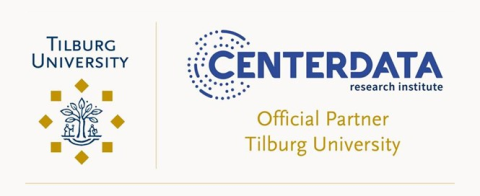
The year 2024
Thirty-seven years later, the CentER light has faded. The once powerful brand has lost share, and the lifeboat has now returned to the mother ship. While CentER still exists as a name, as an institution it has merged into the School, according to former director Eric van Damme: “The CentER culture has been preserved and strengthened. Now, TiSEM as a whole is doing well.” The emphasis on top-notch research came at the expense of education.
International research quality has become a standard benchmark, applied in fields that were barely on the radar when CentER was launched. For a long time, only Economics, Microeconomics, and Econometrics played in the Champions League. Nowadays, the output of Finance, Marketing, Organization & Strategy, Information Systems, and Accountancy has also grown to international top levels. Researchers no longer operate solely from CentER but from their own departments and institutes. Business economists in particular have caught up significantly, with the Marketing Department leading the way.
Branding
The results in the rankings are no longer as spectacular but remain certainly commendable. TiSEM still performs well in various (sub)rankings. The brand by which it is currently making a name for itself is Tilburg University. Kapteyn had observed it before: “CentER, as a top brand, has made way for the brand name of Tilburg University. In the US, people used to raise their eyebrows when you mentioned Tilburg. Now, Tilburg is firmly on the map.”
Recognition and Rewards
Criticizing ‘rankings’ and the ‘publish or perish’ culture, universities have now begun to recognize and reward based on other criteria, such as educational achievements, impact, and management tasks. As a result, the emphasis on research may seem to have faded into the background, but appearances can be deceiving. The School continues to hold a strong position, as confirmed by Marike Knoef, who was appointed as the first female Dean of TiSEM in 2023. She observed the development of CentER from the sidelines since 2001 during her studies in Econometrics and later her PhD studies under Arthur van Soest (2011). She also worked with affiliated institutes such as CAR (2003) and CentERdata (2006-2012) and served as the director of Netspar (2020-2023).
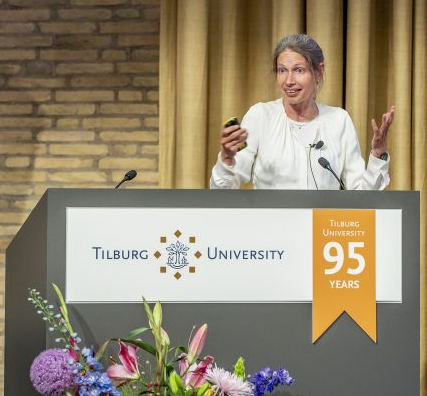
Nowadays, it’s not just about (top-tier) publications, as faculty members have other irons in the fire. You can excel in teaching, operate effectively in terms of impact, be a good administrator or, naturally, perform well on all fronts. This is taken into account in the ‘Recognition and Rewards’ of faculty.
Epilogue
Kees Koedijk (Dean from 2007 to 2013) has summarized the revolution as follows: “CentER was the salvation of the School of Economics and Business (FEB). There were plans to close down departments (Econometrics, Psychology, and Arts). A grand plan was needed to save not only FEB but the entire university. CentER has increased the visibility of FEB in the Netherlands, Europe, the US, and worldwide.” Indeed, much of the credit goes to Arie Kapteyn. The revolution that he unleashed with CentER encountered resistance, like with all revolutions, and opponents had to endure their share of challenges. The result was and is a viable and high-quality School that rose from its ashes. It continues to navigate the international waters successfully, impressing friends and foes alike.
Sources & additional information
- Interviews with Emeritus Professor Eric van Damme, former director of CentER (June 21, 2023), Professor Marcel Das, director of Centerdata (February 9, 2024), Emeritus Professor Lans Bovenberg, former director of CentER and Netspar, and former Associate Professor of Psychology Jan Boelhouwer (both on February 15, 2024).
- Centerpoint no. 37, 2008.
- Final Report of the Investigative Commission for Economics, Academisch economisch onderzoek in Nederland: produktie, produktiviteit en profilering [Academic Economic Research in the Netherlands: Production, Productivity and Profile], Staatsuitgeverij 1986, The Hague.
- A.D.S. de Schuite: De Top-40 van Nederlandse economen [The Top 40 Chart of Dutch Economists], Intermediair, December 17, 1980.
- Clemens van Diek: Arie ‘Baba’ en zijn 40 rovers, alumni magazine KUBUS 1990-1.
- Kleine Encyclopedie Tilburg University 1927-2017, p. 48
- Het einde van de School Schouten [The end of the Schouten School], farewell to Ad Kolnaar, alumni magazine Vice Versa 2007-3.
- See also 25 jaar Centerdata [25 years of Centerdata], Tilburg University website https://www.tilburguniversity.edu/nl/actueel/nieuws/meer-nieuws/25-jaar-centerdata
- Univers, 26 juni 1997
- Univers, 10 febr 2000
- Centerpoint nr 25, 1998.
- Farewell interview with Eric van Damme, Tilburg University website, August 16, 2023, https://www.tilburguniversity.edu/nl/actueel/nieuws/meer-nieuws/afscheid-eric-van-damme
- See TiSEM Business & Management Rankings, Tilburg University website. https://www.tilburguniversity.edu/nl/over/rankings/business-management
- CentER zette Tilburg op de kaart [CentER put Tilburg on the map], alumni magazine Vice Versa 2008-2.
- Centerpoint nr 37, 2008
Publication date: 4 April, 2024

